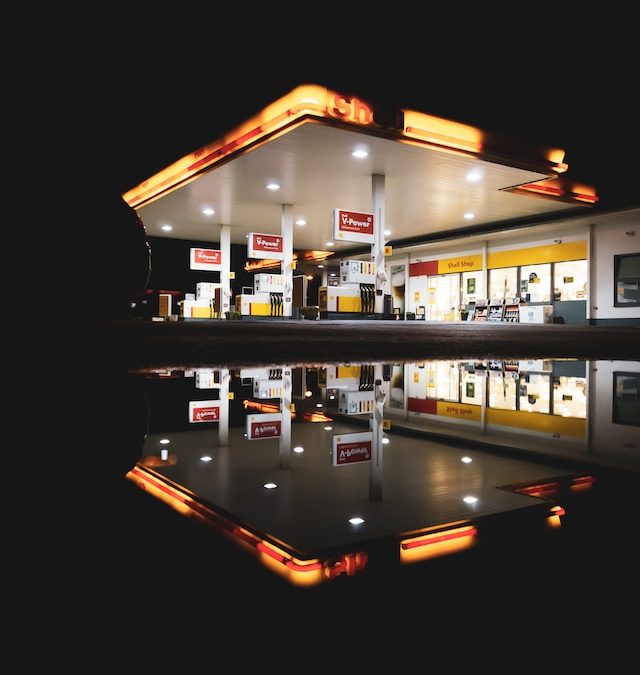
Nigeria Is A Virtual Oil Colony
by Max Wilbert / Deep Green Resistance
People often talk about ecological collapse as if it were a distant scenario that might play out in the future, but the reality is that the planet is currently in a state of collapse. This process has been underway for decades.
Perhaps nowhere is this more evident than Nigeria, the most populous nation in Africa and a state still emerging from its legacy as a principal hub of the transcontinental slave trade and decades of British colonial rule.
Although it has long since gained independence, Nigeria has been a virtual oil colony for more than 60 years. Multinational corporations such as Shell and Chevron essentially run the Nigerian government, funding corrupt politicians and military officers to quash all legitimate dissent. Despite the supposed shift to democracy in 1999, Nigeria remains an economic colony run by oligarchs and foreign corporations. Its current president is retired general Muhammadu Buhari, who some locals describe as “Mr. Oil.”[i]
The hardest-hit zone is the oil-rich Niger River Delta, a vast wetland that has been turned into a toxic cesspool by the equivalent of an Exxon-Valdez sized oil spill every single year. Between oil spills, acid rain, and water contamination, the residents of the Niger River Delta are on the front lines of the environmental and capitalist crisis.
In the 1990’s, political opposition to oil extraction in the Niger River Delta became widespread. Much of the resistance was led by women, as Nigeria has a long history of collective women’s action. But the most famous figure of the resistance was Ken Saro-Wiwa, a poet-turned activist who led the Movement for the Survival of the Ogoni people (MOSOP).
In 1995, Nigeria’s ruling military dictatorship arrested Saro-Wiwa along with 8 other leaders of MOSOP on trumped-up charges. They were tried and executed by hanging, and their bodies were dumped into a mass grave. This atrocity marked the end of the non-violent campaign in Nigeria and the beginning of a new phase of struggle.
In the mid-2000’s, a militant group emerged in Nigeria known as the Movement for the Emancipation of the Niger Delta—MEND. Born out of the failure of non-violence, MEND adopted radical new tactics: kidnapping oil workers for ransom, assassinating executives, and sabotaging oil pipelines, tankers, pump stations, offshore platforms, and other infrastructure.
MEND’s tactics have been innovative, using speed, stealth, and intelligence to target their attacks where they will do the most damage. At the height of their operations, MEND disabled a full half of all oil capacity in Nigeria, the largest oil exporting nation in Africa and a member of OPEC. One analyst writes that MEND’s targets have “been accurately selected to completely shut down production and delay/halt repairs.”[ii]
In 2006, MEND militants released a chilling letter reminding the oil companies of their total commitment.
“It must be clear that the Nigerian government cannot protect your workers or assets. Leave our land while you can or die in it,” the group wrote. “Our aim is to totally destroy the capacity of the Nigerian government to export oil.”[iii]
It is difficult for us to imagine the level of courage it takes for people from the Niger River Delta to rise up in the face of nearly impossible odds against Shell’s elite private mercenary armies and the American-trained special forces units of the Nigerian military.
But we must imagine it, and compare this to our own courage, or lack of courage.
Here in the United States, a grossly inequal and destructive society has been built on land stolen from indigenous people. Slaves built the American capitalism which today is maintained by weapons manufacturers, parasitic drug companies, predatory finance and investment banks, a private prison system that differs little from chattel slavery, and a global oil empire that has been built on the bones of the Ogoni people, on the total poisoning of the Gulf of Mexico, and on the tar sands, the largest and most destructive industrial project on Earth.
The signs of what is happening are so clear ignorance is a willful choice. Just a few days ago, the United Nations warned of imminent “ecosystem collapse.” The IPCC has issued warning after warning of the dire consequences of global warming. Plankton populations, the very foundation of oceanic life and the source of most of the world’s oxygen, are collapsing. Insect populations are collapsing. The last fragments of uncut forests around the world are falling to the chainsaw as fascists and militarists like Bolsonaro, Trump, Putin, Jinping, and Duterte sell off every last fragment of the planet to fund their nationalist, militarist dreams. Coral reefs are dying, wetlands are being drained, and rising seas are expected to make 2 billion people into refugees by century’s end.
As our world teeters on the brink of total ecological and social collapse, we have no more excuses. We have all the information and all the inspiration we need. The times are prompting us to exercise our “revolutionary right to dismember or overthrow” the systems that are murdering the planet and trampling human lives.
If we continue to take no action, we are all cowards. There is no other way to explain our inaction.
Max Wilbert is a third-generation organizer who grew up in Seattle’s post-WTO anti-globalization and undoing racism movement, and works with Deep Green Resistance. He is the author of two books.
[i] Nigeria Oil and Gas: An Introduction and Outlook. By Dele Ogun. Oil and Gas IQ. October 16, 2018. https://www.oilandgasiq.com/market-outlook/news/nigeria-oil-and-gas-an-introduction-and-outlook.
[ii] Nigerian Evoluition. Global Guerillas. January 2006. https://globalguerrillas.typepad.com/globalguerrillas/2006/01/nigerian_evolut.html.
[iii] NIGERIA: Shell may pull out of Niger Delta after 17 die in boat raid. By Daniel Howden. Corpwatch. January 17, 2006. https://corpwatch.org/article/nigeria-shell-may-pull-out-niger-delta-after-17-die-boat-raid.
Photo by Justus Menke on Unsplash
